The question 7 billion people are asking: How do you deal with Donald Trump?
Story highlights
- Michael D'Antonio: Trump has long vexed those who would work with him, compete against him or even seek to understand him
- World leaders everywhere are now faced with the question: How do you deal with Donald Trump?
Michael D'Antonio, the author of "The Truth About Trump," is writing Trump Watch, a series of columns on President-elect Donald Trump for CNN Opinion. The opinions expressed in this commentary are his.
(CNN)Before his election, the closest Donald Trump got to the presidency was on an episode of "The Simpsons" television show, which forecast a dystopian future when he would occupy the Oval Office.
Now,
he is the president-elect, due to occupy the most powerful job in the
world beginning January 20. Trump may be the most unconventional and
perhaps the most controversial man ever elected to the White House.
Since he's someone whose policy positions and style are completely
different from the presidents of recent decades and is known for his
unpredictability, his election presents the nearly seven billion people
who share the planet with him with a most difficult question: How do you
deal with Donald Trump?
Trump
has long vexed those who would work with him, compete against him or
even seek to understand him. On a personal level, his first wife Ivana,
who has known him for forty years, told me
that even after raising three children with Trump she doesn't "get him"
at all. His critics in business and politics have complained that Trump
changes direction so often it's hard to get a reliable fix on him. He
nevertheless made a success of his third marriage and despite
bankruptcies, he's always found new partners for his ventures.
A wild card dealt to foreign leaders
Confronted
with a president who has the thinnest resume in history -- no record in
government, the military, or any other form of public service -- world
leaders are already straining to adapt to Trump's improvisational style.
The president elect hasn't waited for briefings from the State
Department, which typically helps incoming presidents. And he hasn't
shown much interest in diplomatic tradition. Instead he has made a
flurry of calls to other heads of state and received incoming contacts
like a short order cook -- first come, first served.
Australian Prime Minister Malcolm Turnbull swerved around
the usual protocol for contacts with America's closest allies -- the
United Kingdom usually comes first -- and reached Trump by dialing a
phone number he got from pro golfer Greg Norman. Just as remarkable is
that fact that instead of waiting to hear congratulations from abroad,
it was Trump who started calling presidents and prime ministers.
Ireland's Prime Minister Enda Kenny was the first European leader he
spoke to, apparently because his adviser Rudolph Giuliani is well
connected to the Irish Consulate in New York.
Any world leader wondering about how to connect with Trump should take a hint from Japan's Prime Minister Shinzo Abe,
who jetted to New York from meetings in Peru in order to speak with the
President-elect directly. Abe is no doubt aware of Trump's past record
of Japan-bashing -- before he attacked China's trade practices Trump
made the Japanese the enemy -- but he has not made a public issue out of this history or Trump's suggestion, during the campaign, that Japan pay more for the defenses provided by the United States military and, perhaps, acquire nuclear weapons.
A
lifelong salesman who values the personal touch, Trump is unafraid to
negotiate on an impromptu basis and prefers to meet with people
face-to-face or speak to them on the phone (He does not enjoy reading
long memos or proposals). If Abe pointed out that he has already
increased (modestly) Japan's defense spending and that his country can
be a counterweight against China, Trump will be impressed.
The political is personal
Whether
he was acting on the basis of intuition, or research into Trump's modus
operandi, Abe was right to use the idea that he was in the
neighborhood, well, at least the hemisphere, to justify popping-in at
Trump Tower. Always partial to the person who hustles ahead of others,
Trump also believes that he is a great judge of human beings and that he
can determine in an instant whether he's dealing with someone he can
trust.
In my conversations with
Trump, he criticized Barack Obama for failing to operate in the same
way. He thought his predecessor should have met more frequently with
members of Congress in order to cultivate productive relationships with
them.
Congressional leaders who
would get along with Trump would do best to follow Abe's example and
make the effort to spend time with the man. Representatives from states
that profit by foreign trade -- Texas, New York, California, etc. -- would do well to tell Trump about it before he acts to make his campaign promises come true. The same goes for those who would like to protect as much of Obamacare as possible.
When
Trump sat down with President Obama last week to discuss just what it
is the president does -- he and his team have seemed unsteady on this
matter -- he heard a pitch for keeping parts of it. Apparently
persuaded, Trump soon said he'd like to keep certain popular provisions, like guaranteeing insurance for people with pre-existing conditions.
Exasperating
as it may be to learn that a man who ran for president by attacking
Obamacare only now seems to understand it, Trump's change-of-heart
speaks to the importance of making personal appeals in order to
influence his politics. As a pragmatist who was a registered Democrat from 2001 to 2009, Trump is not a lifelong Republican, nor does he take consistently hard-right positions on issues.
During the Republican Presidential Debate in Houston,
he was criticized by opponents when he said government should make sure
poor people get life-saving medical care. As Senator Ted Cruz
sputtered, about this idea being tantamount to socialism Trump said,
"Call it what you want, people are not going to be dying on the
sidewalk." It was hardly a hero's stand on behalf of the poor, but in a
party that includes some anti-government extremists, it revealed Trump's
comparative flexibility.
He can be co-opted
It
is the flexible, some would say equivocating, side of Trump that
members of the House and Senate might seek out during the transition and
when he assumes power. No one knows this better than New York Senator
Charles "Chuck" Schumer, a Democrat who will be take the role of
minority leader after Senator Harry Reid of Nevada retires.
Schumer,
who has received campaign donations from Trump, has known him for
decades. He has signaled that rather than oppose the new president on
everything, as House Republicans determined to do when Obama was first
elected, he will seek common ground on issues such as public works projects, paid maternity leave, and child tax credits.
If
they can make common cause with Trump on issues that matter to their
own supporters, and, in their mind, to the United States as a whole,
Democrats might be able to triangulate the Tea Party members of the GOP
and others who are rigidly anti-spending and consider everything that
Obama touched to be anathema.
For
his part, Trump has always appreciated the value of leverage, in the
form of the heavy debt he has sometimes placed on his companies. He
won't be afraid of adding to the national debt if he believes the
spending is an investment that will pay dividends in the form of
eventual higher tax returns that one day can stanch the red ink.
In
the meantime, he would be able to goose the economy, especially if he
slashes taxes, and create at least the impression that he's doing a good
job for Middle America. Long a man who appreciates the appearance of
success almost as much as success itself, Trump will gladly team with
Democrats against hardliners in his party if the rewards are right.
Fight when you must
Never
inclined to leave anything on the table, Trump can be expected to push
as hard as he can for his agenda. He is also willing to frighten
everyone in sight if it gives him a tactical advantage. This may be why
he gave one of the top positions in the White House to Steve Bannon, who was in charge of Breitbart.com, which has published anti-Semitic and misogynistic posts.
Bannon is a leader of the so-called alt-right, which is regarded by large numbers of Republicans as well as Democrats as a dangerous white nationalist movement.
Bannon's appointment could have been a sop to this tiny portion of the
electorate or he could constitute a kind of human threat, poised to
carry out the most extreme policies in the agenda Trump presented during
the campaign.
Perhaps the most extreme of these ideas is Trump's call for mass deportation
of undocumented Mexican immigrants, many of whom have lived many years
in the U.S. and have deep roots in local communities. Others that lurk
outside the realm of decency, and perhaps the law, include a ban on
Muslims entering the United States. Trump has, himself, backed away at
least in part from these ideas.
However
Bannon's appointment may indicate otherwise. Should Trump light a match
and turn toward the most divisive policy proposals of the campaign,
either because he believes they are right for the country or that they
make for good politics, opponents must consider themselves to be
swimmers confronted by a menacing shark. If all else fails, punch him in
the nose.
Although Trump says he never backs down, of course he sometimes does. Among the few publicly available records of Trump's past one can find accounts of lawsuits he has settled
in order to end a conflict. In one of the few that involved a public
policy issue, Trump settled a claim the Justice department brought
against the family business for racial discrimination against lease
applicants by agreeing to change practices. Recently the New York Daily News reported that Trump is ready to settle the big fraud lawsuit filed against his so-called university in federal court.
Bring a celebrity, and shake his hand
Although Trump was once a renowned germophobe
who avoided shaking hands, he is more or less over that little foible.
In fact, he enjoys interacting with the stream of visitors who have
trekked to Trump Tower over the years and has always considered himself
the kind of man who keeps his word, especially when a handshake is
involved.
Views on the Trump Transition
Andre Spicer: Where liberals will hide
How Trumponomics could split GOP in two
Jane Merrick: Trump shouldn't let down his supporter
Trump tax cut: Here's how to do it
Dr. Oz: Trump, please act on opioids
Trump's messy conflicts of interest
S.E. Cupp: Trump makes first big mistake
Democrats, stop blaming others
The end of the liberal era
Trump is everything I feared
How to restore faith in US democracy
Why I walked out with my students
Chris Doyle: Trump needs Muslim friends to beat ISIS
Why we can't forget the racism of this campaign
Michael D'Antonio: Trump's presidential role model
Slma Shelbayah: Wearing a hijab in Trump's America
How Trumponomics could split GOP in two
Jane Merrick: Trump shouldn't let down his supporter
Trump tax cut: Here's how to do it
Dr. Oz: Trump, please act on opioids
Trump's messy conflicts of interest
S.E. Cupp: Trump makes first big mistake
Democrats, stop blaming others
The end of the liberal era
Trump is everything I feared
How to restore faith in US democracy
Why I walked out with my students
Chris Doyle: Trump needs Muslim friends to beat ISIS
Why we can't forget the racism of this campaign
Michael D'Antonio: Trump's presidential role model
Slma Shelbayah: Wearing a hijab in Trump's America
A
good example is the story he tells about how he negotiated the deal for
his TV show "The Apprentice." As he explained to me, the entire
arrangement was worked out in a single face-to-face meeting with
producer Mark Burnett. The result was a lucrative arrangement for both
men, which endured for more than a decade and brought Trump into
millions of American living rooms.
For
members of Congress, foreign diplomats and other leaders who must deal
with Trump, face-to-face negotiation concluded with a
look-him-in-the-eye handshake will be essential. Trump revels in duels
that involve cagey lawyers and complex contracts, and always looks for
escape clauses that let him do whatever he wants. However, he also
fancies himself a man who keeps the promises he makes.
Finally, it's noteworthy that in a frenzied week of serious challenges, Trump nevertheless took time
to interact with a world-renowned boxer, a TV judge, a pro
skateboarder, and television host Piers Morgan. Always inclined to bask
in the glow of other famous people, Trump apparently retains his
fascination with celebrities. Anyone who seeks an audience, and
influence with him would do well to bring one along.

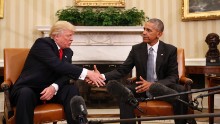

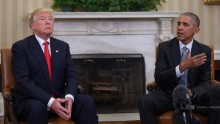
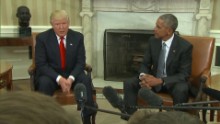




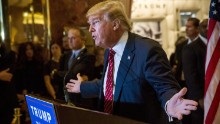
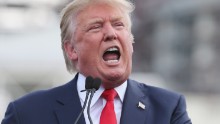
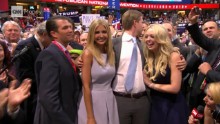
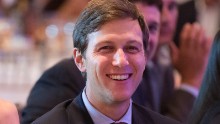
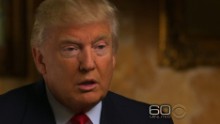
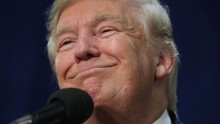
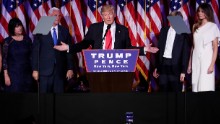





No comments:
Post a Comment